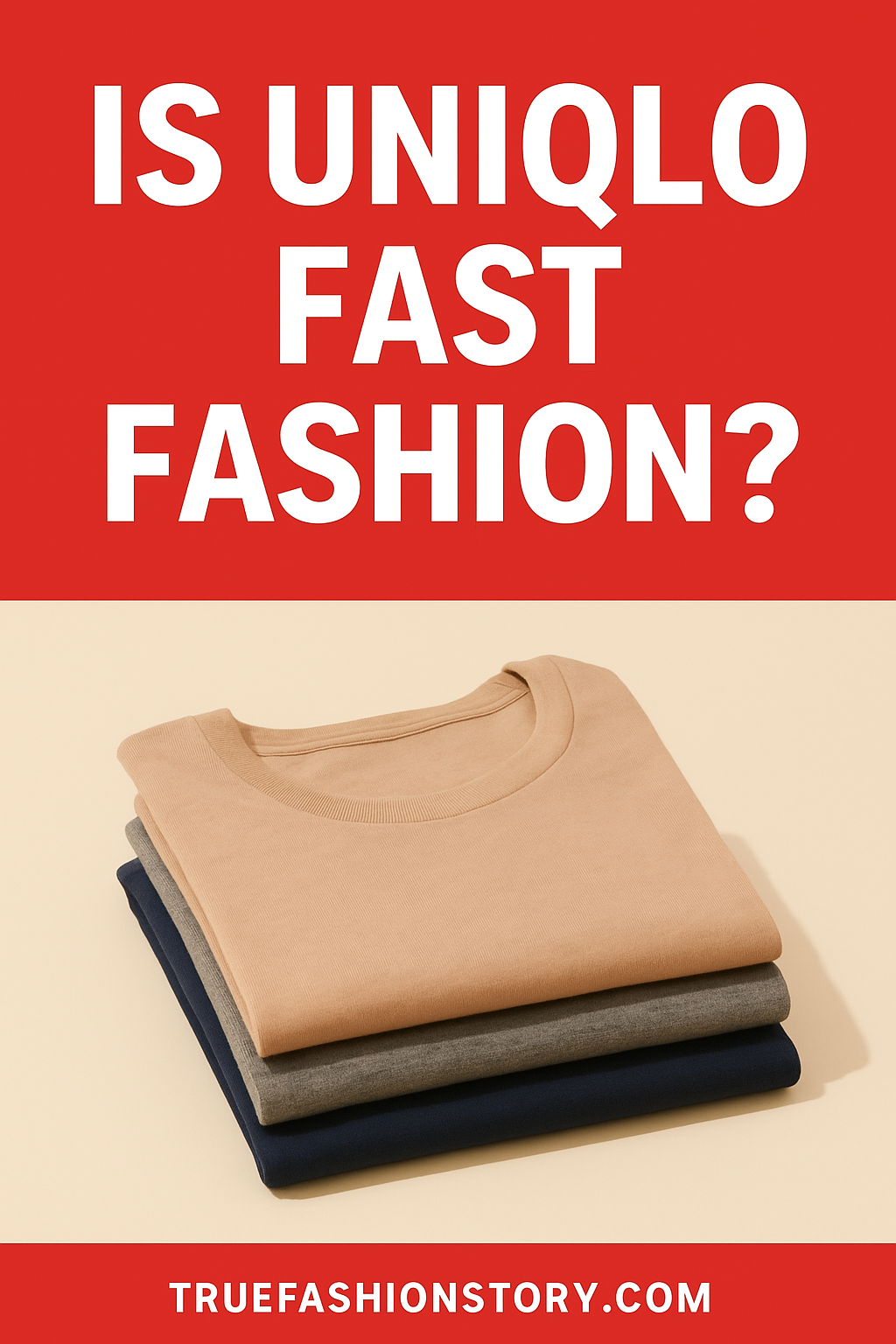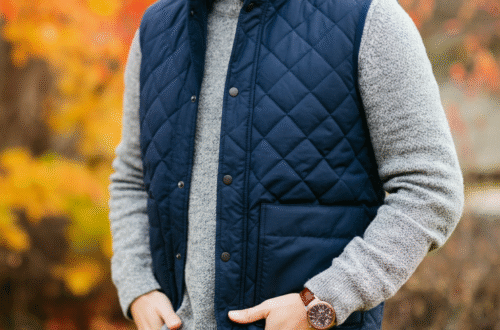When you walk into a Uniqlo store, you’re greeted by a rainbow of neatly folded basics, high-quality-feeling fabrics, and timeless designs. It doesn’t scream “fast fashion” in the same way as stores with racks of fleeting, low-quality trends. Yet, the prices are affordable, and new collections appear regularly. This leaves many shoppers wondering, is Uniqlo fast fashiony?
The answer isn’t a simple yes or no. Uniqlo operates in a gray area, blending elements of fast fashion with a business model that emphasizes quality and longevity. To truly understand where the brand stands, we need to look closer at its production cycle, material choices, pricing, and overall philosophy. This article will break down the complexities, helping you make a more informed decision as a consumer.
Key Takeaways
- Uniqlo’s business model focuses on “LifeWear,” creating durable, timeless basics rather than chasing short-lived trends.
- While it has a faster production cycle than traditional fashion, it is generally slower than typical fast fashion giants like Shein or Zara.
- The brand has faced criticism regarding its supply chain transparency and labor practices, which are common issues in the fast fashion industry.
- Uniqlo uses both innovative, higher-quality materials and conventional ones like polyester, complicating its sustainability profile.
- Ultimately, whether you consider Uniqlo to be “fast fashiony” depends on your personal definition and ethical priorities.
What Exactly Is Fast Fashion?
Before we can determine if Uniqlo fits the bill, we need a clear definition of fast fashion. At its core, fast fashion is a business model characterized by producing high volumes of clothing at a very low cost to reflect current micro-trends.
Think of it this way: a trend appears on the runway or social media, and within weeks, a fast fashion brand has a cheaper version of it in stores. This model encourages consumers to buy more clothing more often, leading to a culture of disposability.
Core characteristics of fast fashion include:
- Rapid Production Cycles: Brands can take a design from concept to store shelf in just a few weeks.
- Low Prices: Clothing is made to be incredibly affordable, making impulse buys common.
- Trend-Based Designs: Collections are based on the latest, fleeting styles seen on celebrities and influencers.
- Low-Quality Materials: To keep costs down, synthetic materials like polyester and nylon are frequently used, often resulting in garments that don’t last long.
- Frequent Collection Drops: New items arrive in stores weekly, or even daily, creating a constant sense of newness and urgency.
This system has significant environmental and ethical consequences, from massive textile waste to poor working conditions for garment workers. Understanding this definition is the first step in evaluating if is Uniqlo fast fashiony is a fair question.
Uniqlo’s Business Model: LifeWear vs. Fleeting Trends
Uniqlo’s core philosophy is “LifeWear.” The company describes this as “apparel that comes from the Japanese values of simplicity, quality, and longevity.” This is the first major point where Uniqlo diverges from the typical fast fashion playbook.
Instead of chasing micro-trends, Uniqlo focuses on creating staple pieces that can be worn for years. Think of their classic crewneck sweaters, versatile denim, and functional outerwear. These are not items designed to be worn for one season and then discarded. The brand invests in fabric innovation, like its HEATTECH and AIRism lines, to create clothing that is functional and comfortable.
This focus on timeless essentials and quality is a direct contrast to the trend-driven, disposable nature of fast fashion. While a fast fashion brand might release a dozen variations of a trendy top, Uniqlo will perfect one or two classic styles and offer them in a wide range of colors. This approach encourages building a lasting wardrobe rather than constantly refreshing it. For more insights on building a sustainable wardrobe, you can explore resources like the truefashionstory.com Blog.
The Speed of Production at Uniqlo
So, if Uniqlo isn’t chasing trends, does that mean its production is slow? Not exactly. Uniqlo still operates on a relatively fast production schedule to keep its stores stocked and respond to demand. However, it’s not as breakneck as other brands.
While a brand like Zara can get a product to market in about two to four weeks, Uniqlo’s lead time is longer, though not as long as traditional fashion houses which can take six months to a year. Uniqlo plans its core collections far in advance, sometimes up to a year. This allows them to secure large volumes of fabric at lower costs, which helps keep their prices affordable.
This hybrid model allows them to maintain a steady flow of their popular basics while occasionally introducing new collaborations or seasonal items. So, while it’s faster than traditional retail, it’s more measured and planned than the reactive, chaotic pace of true fast fashion.
Analyzing Uniqlo’s Pricing and Quality
One of the biggest indicators of fast fashion is a suspiciously low price tag. Uniqlo’s prices are definitely affordable, but how do they compare to the quality offered? This is where the is Uniqlo fast fashiony debate gets interesting.
Are the Prices Too Good to Be True?
Uniqlo’s pricing strategy is built on volume. By producing a smaller range of styles in massive quantities, they achieve economies of scale. They order their fabrics way in advance, locking in better prices. This efficiency is passed on to the consumer. A Uniqlo t-shirt might not be as cheap as one from a bargain-basement fast fashion brand, but it’s still accessible to most shoppers.
The key difference is perceived value. Many consumers feel that Uniqlo’s clothing offers better quality and durability for the price compared to its fast fashion counterparts. The fabrics often feel more substantial, the stitching is cleaner, and the garments tend to hold up better after washing.
Material Choices: Innovation Meets Convention
Uniqlo is known for its fabric technology. Lines like HEATTECH (for warmth), AIRism (for cooling), and Blocktech (for wind and rain protection) are a result of significant research and development. These are not the cheap, flimsy polyesters that define many fast fashion items.
However, Uniqlo still relies heavily on conventional materials. A large portion of their products are made from cotton, and while they are part of the Better Cotton Initiative (BCI), a lot of it is not organic. They also use synthetics like polyester, rayon, and nylon, which are derived from fossil fuels and contribute to microplastic pollution. This mixed bag of innovative and conventional materials makes it difficult to give their sustainability efforts a blanket endorsement.
Uniqlo and Its Ethical Scorecard
A brand’s ethical practices are a crucial part of the fast fashion discussion. This includes supply chain transparency and the treatment of garment workers. Uniqlo, like many global apparel giants, has faced scrutiny in this area.
Supply Chain Transparency
Uniqlo’s parent company, Fast Retailing, has made some strides in transparency. They publish a list of their core fabric mills and garment factories. This is a positive step, as it allows for some level of public accountability. However, transparency does not automatically equal ethical production.
The brand has received criticism for not providing enough detail about its entire supply chain, particularly at the raw material stage. It’s often in these early stages, like cotton farming, where the most significant environmental and labor issues can occur. Without full traceability, it’s hard for consumers to know the true impact of their purchase.
Labor Practices and Controversies
Over the years, Uniqlo has been linked to several labor rights controversies. Reports have emerged from factory monitoring groups detailing issues such as excessive overtime, low wages, and unsafe working conditions in some of its supplier factories.
In 2021, the brand faced allegations of using cotton sourced from the Xinjiang region in China, where forced labor of the Uyghur population is a major concern. While Uniqlo has stated it has a zero-tolerance policy for forced labor and that no products are manufactured in the region, the complexity of cotton supply chains makes such claims difficult to verify completely. These issues are common red flags in the fast fashion industry and certainly contribute to why people ask is Uniqlo fast fashiony.
Uniqlo vs. True Fast Fashion Brands
To put it all in perspective, let’s compare Uniqlo to a brand that is undeniably fast fashion.
|
Feature |
Uniqlo |
A Typical Fast Fashion Brand (e.g., Shein, Zara) |
|---|---|---|
|
Business Model |
LifeWear: Focus on timeless, quality basics. |
Trend-driven: Focus on recreating fleeting runway styles. |
|
Design Focus |
Simplicity, functionality, and longevity. |
Novelty, variety, and disposable trends. |
|
Production Speed |
Planned, but still relatively fast (months). |
Extremely rapid (weeks). |
|
Pricing |
Affordable, but reflects better perceived quality. |
Rock-bottom prices encouraging overconsumption. |
|
Material Quality |
Mix of innovative fabrics and conventional materials. |
Primarily cheap synthetics like polyester and nylon. |
|
In-Store Updates |
New colorways and collaborations, but core items remain. |
New collections and items delivered weekly or daily. |
This comparison shows that while Uniqlo shares some characteristics with fast fashion, such as affordable pricing and a large global footprint, its core philosophy and product strategy are fundamentally different.
The Verdict: So, Is Uniqlo Fast Fashiony?
After examining its business model, production cycle, quality, and ethics, it’s clear that Uniqlo doesn’t fit neatly into the fast fashion box. It’s more of a hybrid.
Arguments for Uniqlo being “fast fashiony”:
- It produces clothing in large volumes at affordable prices.
- It uses a relatively fast production timeline to keep stores stocked.
- It relies on some unsustainable materials like conventional cotton and polyester.
- The brand has faced ethical concerns in its supply chain.
Arguments against Uniqlo being fast fashion:
- Its core philosophy is “LifeWear,” promoting long-lasting basics over disposable trends.
- It invests in fabric innovation and generally offers better quality than typical fast fashion.
- Its production model is more planned and less reactive than that of trend-chasers.
Uniqlo could be considered a “gateway” brand. It’s a step up from the most notorious fast fashion players, but it’s not a truly sustainable or slow fashion brand. It occupies a middle ground, making it a better choice for some, but not a perfect one for those strictly avoiding the impacts of mass-market apparel.
Ultimately, how you classify Uniqlo depends on your own values. If your main concern is avoiding fleeting trends and buying clothes that last, Uniqlo is a reasonable option. If your priority is ensuring the highest ethical and environmental standards, you may want to look toward smaller, more transparent slow fashion brands.
FAQs
Q1: Is Uniqlo better than Zara or H&M?
In terms of product philosophy, Uniqlo is often considered better because it focuses on longevity and timeless style rather than rapid trends. Its clothing is generally designed to last longer. However, all three brands are global giants that face similar challenges regarding supply chain ethics and environmental impact.
Q2: Does Uniqlo have a recycling program?
Yes, Uniqlo has a clothing recycling program called RE.UNIQLO. Customers can drop off used Uniqlo clothing at any store. Items that are still wearable are donated to those in need, while other items are recycled into new materials or fuel.
Q3: What is Uniqlo’s policy on sustainability?
Uniqlo’s parent company, Fast Retailing, has outlined sustainability goals related to reducing greenhouse gas emissions, conserving water, and moving toward more sustainable materials. However, like many large corporations, their progress and the full impact of their operations are complex and subject to scrutiny.
Q4: Are Uniqlo’s clothes made to last?
Generally, yes. Compared to ultra-fast fashion brands, Uniqlo’s clothing is known for better construction and more durable materials. Their focus on basics means the styles don’t become dated quickly, encouraging consumers to keep and wear them for longer.





